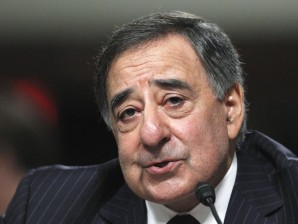WASHINGTON – The US Senate unanimously confirmed Leon Panetta’s nomination to be defense secretary on Tuesday, hailing his successes as CIA chief just as major challenges await him in Afghanistan and Libya.
All 100 members of the Senate approved the nomination of Panetta, a rare move of unanimity for a federal government official.
The incoming defense chief will have to oversee a troubled war in Afghanistan, the withdrawal of the remaining American troops from Iraq, and US involvement in the NATO-led Libya campaign.
But lawmakers hailed his role in tracking down and eliminating Osama bin Laden, killed in a dramatic US commando raid last month deep in Pakistan.
“The nomination of Leon Panetta to be secretary of defense is a wise and solid one,” said Senator Carl Levin, the Democratic chair of the Senate Armed Services Committee.
John McCain, the top Republican on Levin’s panel, said that as CIA director, Panetta “has demonstrated he possesses the experience and ability to ensure that we achieve our our objectives in the three conflicts in which US forces are now engaged: Iraq, Afghanistan and Libya.”
Panetta, who began his political career as a lawmaker in Congress, becomes the first Democrat to hold the top defense job since William Perry in 1997.
In a break with outgoing Pentagon chief Robert Gates, Panetta, who turns 73 next week, has said he supported the withdrawal of a significant number of troops from Afghanistan next month.
Obama is due to announce Wednesday his plans to withdraw troops from Afghanistan as the military works to put Afghans in charge of their own security by 2014 and wrap up what is now an almost decade-long war.
A senior defense official said on condition of anonymity that the president would “likely” order the withdrawal of about 10,000 troops from Afghanistan this year. Half would come out this summer and half by the end of 2011.
Another 20,000 troops, part of a 30,000 strong surge ordered in December 2009, would be withdrawn by the end of next year, meaning elevated force levels would remain through two more Afghan summer fighting seasons.
Panetta, on track to replace Gates July 1, would thus be in charge of managing the withdrawals, along with other operations in Afghanistan, where the United States currently maintains 99,000 forces.
He would also oversee the US military intervention in Libya against the regime of longtime ruler Moamer Kadhafi, which began in March. Washington has insisted it is only playing a support role under NATO in air raids and intelligence-gathering operations in the north African country.
But the Obama administration is facing growing frustration in Congress, where lawmakers are furious they were not consulted before the operations were launched just as the intervention grows increasingly unpopular among a war-weary US public.
Beyond Afghanistan and Libya, Panetta will also be charged with reining in the Pentagon’s massive spending now being debated in Congress amid record US deficit and debt.
“In this time of tight budgets, he knows how to do more with less,” said Senate Majority Leader Harry Reid. “He has the experience to make high-stakes decisions on matters vital to our national security especially.”
Levin pointed to the “enormous responsibilities” now before Panetta, while expressing confidence that the man who once served as president Bill Clinton’s budget chief was up to the job.
Meanwhile, General David Petraeus, now the US commander in Afghanistan, is due to testify before the Senate Intelligence Committee on Thursday for his nomination hearing.
Considered the architect of the successful US surge strategy in Iraq, Petraeus is respected by lawmakers on both sides of the aisle.
